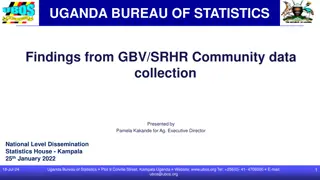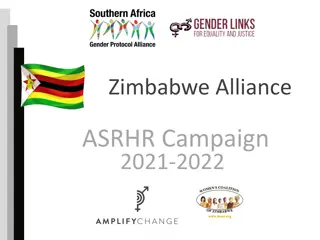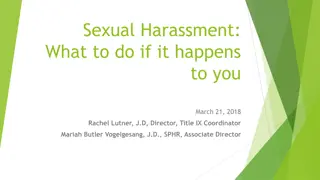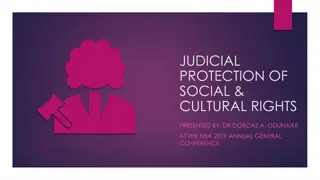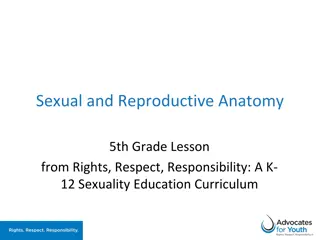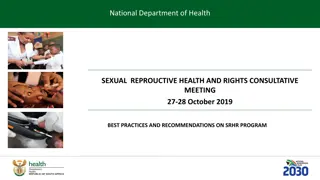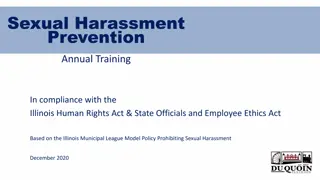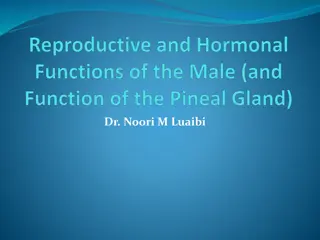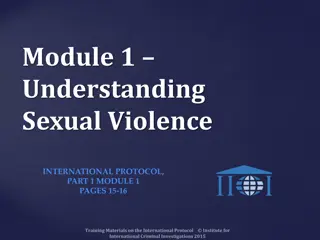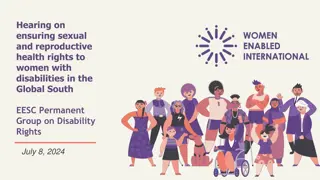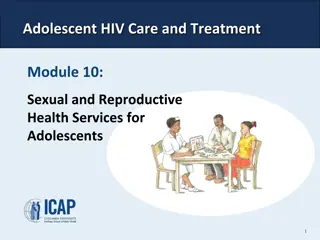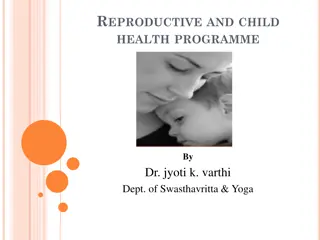Understanding Sexual and Reproductive Health Rights in Nigeria
This presentation by Oby Nwankwo, Executive Director at CIRDDOC Nigeria, at the UN CEDAW Committee covers topics such as reproductive rights, status of women's health in Nigeria, HIV, contraception, maternal health, and the role of traditional leaders. It emphasizes the importance of sexual and reproductive health, including rights to information, services, and decision-making free from discrimination or coercion.
Download Presentation

Please find below an Image/Link to download the presentation.
The content on the website is provided AS IS for your information and personal use only. It may not be sold, licensed, or shared on other websites without obtaining consent from the author. Download presentation by click this link. If you encounter any issues during the download, it is possible that the publisher has removed the file from their server.
E N D
Presentation Transcript
Understanding Sexual & Reproductive Health & Rights By Oby Nwankwo Executive Director, CIRDDOC Nigeria s Rep at the UN CEDAW Committee
Summary of Presentation Introduction and Definitions Status of Women s Reproductive Health and Rights in Nigeria HIV Harmful Traditional Practices Contraception and Family Planning Maternal Mortality and morbidity Adolescents Role of the Traditional Rulers and Religious leaders
Introduction and Definitions Reproductive Rights the basic right of all couples and individuals: To decide freely and responsibly the number, spacing and timing of their children To have the information and means to do so To attain the highest standard of sexual and reproductive health. To make decisions concerning reproduction free of discrimination, coercion and violence, as expressed in human rights documents.
Highest Standard of Sexual and Reproductive Health Women have the following rights under the law: To accessible, affordable and adequate health care that takes into account and responds to their peculiar needs as women. To access health care without discrimination. SRH encompasses a range of prevention and treatment services. accurate information about HIV transmission; ability to choose whether and when to get pregnant; Protection from & response to VAW; Services for sexually transmitted infections and reproductive tract illnesses, such as cervical cancer. Access to these services is part and parcel of the universal right to the highest attainable standard of health, yet, because these services are basic care only for women and girls, their protection requires special attention.
Reproductive Health A state of complete physical, mental and social well being (not merely the absence of disease or infirmity) in all matters related to the reproductive system, its functions and processes. It is not just a concern during a woman s so-called reproductive years , customarily defined as ages 15 to 45. It is a lifetime concern for both women and men, from infancy to old age.
Reproductive health (RH) RH implies that people are able to have a satisfying and safe sex life to have the capability to reproduce and the freedom to decide if, when and how often to do so. RH is the right of men and women to be informed to have access to safe, effective, affordable and acceptable methods of family planning of their choice, to other methods of their choice for regulation of fertility which are not against the law, to have access to appropriate health-care services that will enable women to go safely through pregnancy and childbirth to the best chance of having a healthy infant.
Reproductive Rights Sexual and reproductive rights are inalienable, integral and indivisible parts of universal human rights. Sexual and reproductive rights are also a cornerstone of development. Attaining the goals of sustainable, equitable development requires that people are able to exercise control over their sexual and reproductive lives.
Sexual and Reproductive Health Reproductive and sexual health as a component of overall health, throughout the life cycle, for both men and women; Reproductive decision-making, including voluntary choice in marriage, family formation and determination of the number, timing and spacing of one s children right to have access to the information and means needed to exercise voluntary choice;
Maternal Health Maternal health is an important part of sexual and reproductive health and rights. Worldwide, one woman dies every 90 seconds in pregnancy or childbirth - more than 350,000 women each year. The vast majority of these deaths are preventable. Lack of education about pregnancy or access to trained caregivers for ante-natal care and assisted delivery are driven by gender based discrimination. In addition, VAW increases during pregnancy.
Violation of SRHR Despite international and national obligations, violations of women s SRHR are frequent. These take many forms including denial of access to services that only women require, or poor quality services, subjecting women s access to services to third party authorization, and performance of procedures related to women s SRH without the woman s consent, including forced sterilization, forced virginity examinations, and forced abortion. Women s SRHR are also at risk when they are subjected to FGM and early marriage.
SRHR Violations of women s SRHR are often deeply engrained in societal values pertaining to women s sexuality. Patriarchal concepts of women s roles within the family mean that women are often valued based on their ability to reproduce. Early marriage and pregnancy, or repeated pregnancies spaced too closely together, often as the result of efforts to produce male offspring because of the preference for sons, has a devastating impact on women s health with sometimes fatal consequences. Women are also often blamed for infertility, suffering ostracism and being subjected various human rights violations as a result.
SRH Access to affordable and relevant health services and to accurate, comprehensive health information are fundamental human rights. Yet, gender-based discrimination, lack of access to education, poverty, and VAW/G can all prevent these rights from being realized for women and girls -- challenges that are often particularly acute when it comes to SRHRs and safe motherhood.
HIV Addressing the HIV epidemic is an integral part of addressing SRHR. Sexual relations is one of the primary modes of HIV transmission The right to information, autonomy and non- discrimination, are critical to successful AIDS responses.
HIV Gender inequalities often limit young women s access to health care and education, resulting in young women accounting for a disproportionate number (60%) of new infections among young people living with HIV. GBV, including rape, and early marriage prevent women & girls from being able to adequately protect themselves from HIV. Women living with HIV also face challenges to being able to make autonomous and informed family planning decisions; Lack of adequate information on family planning
HIV High Risk Groups Certain population groups face higher risks of contracting HIV due to factors related to discrimination and exclusion. Gay Men who have sex with men Sex workers Criminalization of sex work, as well as stigmatizing social environments, increases this vulnerability Stigma and discrimination drive vulnerable communities away from HIV prevention, treatment and care.
HIV Impact on Womens Health Women s and adolescents SRHRs are severely impacted by HIV As a consequence of unequal power relations based on gender, women & girls are often unable to refuse sex or insist on safe and responsible sex practices. HTPs, such as FGM, polygamy, and marital rape, may also expose girls and women to the risk of contracting HIV/AIDS and other sexually transmitted diseases.
HIV and Risky behaviour Lack of property and inheritance rights also expose women and girls to risky behaviours with men To keep their husband s property since access to property and inheritance is only through a male relative. Contributes to the spread of HIV and AIDS and exposes women to danger.
Role of Traditional Rulers Note on the flip chart paper the input of participants.
Role of Traditional Rulers Eliminate stigma, discrimination and violence related to HIV, Promote access to HIV prevention, treatment, care, Support non-discriminatory access to education, health care, employment and social services, Protect for people affected by HIV, including and respect for privacy and confidentiality, Promote and protect all human rights and fundamental freedoms, with particular attention to all people vulnerable to and affected by HIV, Empower women to participate freely and responsibly on matters related to their sexuality, Promote responsible, safe & respectful behaviour by men Promote gender equality.
Harmful practices A variety of harmful practices exist, including FGM, child and/or forced marriage, polygamy, denial of inheritance and widowhood practices. They are a violation of women s & girls human rights & a form of violence against them &put women s SRHRs at great risk. They are deeply grounded in discrimination on the basis of sex, gender, age and other grounds. All these have significant impacts on the enjoyment of SRH.
Early Marriage Women who marry at a young age are likely to have husbands who are much older than they are up to 25 years older in some cases. Difference in age reduces the women s ability to participate in decisions about childbearing or be able to negotiate the use of contraceptives. In 2003, the National Assembly passed the Child s Rights Act which put the age of marriage at 18. More than 23 states including Anambra, Ebonyi, Imo and Abia states have domesticated the Act. Enugu is the only state in the South East Zone that has not passed the Child s Rights Law.
Early marriage Few state Governments like Edo and Cross River states have introduced laws to criminalise Early marriage and FGM, implementation of the laws poses serious challenges. Child and forced marriage, which disproportionately affects girls, contributes to the likelihood of girls becoming pregnant before they are ready physically or mentally. Early marriage is a leading cause of maternal mortality
Inheritance In some communities, a woman can neither inherit property from her father nor from her husband. She cannot inherit her father s property because she will soon be sold off to another family. In her husband s family, she cannot inherit directly because of the possibility of divorce or remarriage. A woman can only inherit through her son; where she does not have one, she ceases to be qualified. If the marriage is blessed with only daughters, the estate would go to a brother or distant male relative of her husband.
Inheritance This was the situation until the recent Supreme Court decisions. In Mojekwu v Ejikeme (1997) 7 NWLR (Pt. 512) 28 and Mojekwu v Mojekwu (2000) 5 NWLR 403. In Mojekwu v Mojekwu, the Oli-Ekpe custom which permits the son of the brother of the deceased to inherit his property to the exclusion of his female children was to be discriminatory and inconsistent to natural justice, equity and good conscience In Mojekwu v Ejikemeheld Nrachi Nwanyicustom of Nnewi which enables a man to keep one of his daughters unmarried in the family to raise male children to succeed him was declared repugnant to natural justice, equity and good conscience and contrary to CEDAW as it promotes prostitution.
Inheritance Onyibor Anekwe & Anor v. Maria Nweke, Supreme Court held that Nigerian customs, which disinherit women are repugnant to natural justice, equity and good conscience and should therefore not be allowed to stand. Court declared as repulsive the custom of Awka people that disinherited women upon the death of their husband because they did not have male children. A widow, Maria Nweke, had in 1991 instituted a case at the Awka High Court against her in laws who wanted her to move out of her matrimonial home for lack of sons. This is a landmark decision and is bound to contribute rapidly to the enjoyment of the right to equality before the law between women and men in Nigeria especially as it concerns obnoxious customary laws.
INHERITANCE In Gladys Ada Ukeje vs Lois Chituru Ukeje & Enyinnaya Lazarus Ukeje (2014) Supreme Court: Invalidated the Customary Law denying female descendants the right to Inherit Found that the Igbo inheritance rules that exclude women from inheritance violate the country's 1999 Constitution Any culture that dis-inherits a daughter from her father s estate or wife from her husband s property by reason of God instituted gender differential should be punitively dealt with . Gladys had sued the deceased s wife and son at the Lagos High Court, claiming to be one of the deceased s children and seeking to be included among those to administer and inherit their deceased father s estate
Harmful Widowhood Practices Death is always shocking to those closely associated with the dead person. For women, the death of a husband has an extra significance because it represents not simply the departure of a partner and breadwinner, but also heralds a change in her social status and lifestyle. Women have virtually no rights upon the death of their husbands - they are subjected to severe social, cultural and economic sanctions. Often blamed for their husband s death, while the family of the husband takes all the property as well as the children. No support from her in-laws and traditional prescription for mourning behaviour impedes her ability to support herself.
Widowhood Widowhood rituals in some Nigerian cultures provide for inhuman and degrading treatment of the widow by the extended family members. She is often accused of killing her deceased husband and may have to undergo trial by ordeal (drinking of water used to wash the corpse) to prove her innocence. She may be forced to sit unwashed among ashes for days or weeks and forced to wail incessantly to show remorse and grief Overall, widows are subjected to the following: Disinheritance, Forced marriage to In- Laws (wife inheritance) Prolonged mourning for weeks, months or for over a year, Restriction to the house Forbidden from eating certain food items, Forced to sleep with the corpse Required to wear dark/dull mourning clothes for weeks or for over a period of a year, the widow must shave her head. Forced out of the matrimonial homes , Forced to take cold water bath Deprived of basic personal hygiene (i.e. not allowed to take a bath for days)
Early/Child marriage Early marriage usually leads to early motherhood. Expectations from in-laws & society are to give birth soon after marriage - many young wives feel pressure to bear sons. Typically results in pregnancies occurring too soon in the young mother s life. Women die every year from pregnancy-related causes - four reasons for these deaths: Births are either too soon, too close, too many, or too late . Young women most often die during pregnancy. Early marriage & early motherhood can severely curtail educational & employment opportunities Likely to have a long-term, adverse impact on their and their children s quality of life.
Female Circumcision FGM is typically carried out with primitive, unsterilized instruments while the young girl is forcibly held down. Immediate and very common complications include violent pain, shock, hemorrhage, injury to adjacent organs, infection and death. Later problems include scarring, painful and prolonged menses, recurrent urinary tract infection, sexual complications, psychological trauma and difficult childbirth, prolonged labour, lacerations and vesico- vaginal and recto-vaginal fistulas. A person who has suffered a trauma such as this cannot be said to be healthy.
Harmful Practices & SRHR Harmful practices constitute a violation of women and children s right to health. Harmful practices are harmful to the health of women and children and carry a high risk of death and disability. FGM can lead to various immediate and long-term health consequences, including severe pain, shock, infections and complications during childbirth (affecting both the mother and child), long-term gynaecological problems such as fistula, psychological effects and death.
Role of Traditional Rulers Enforce legislation proscribing harmful widowhood practices (Enugu and Anambra), female circumcision and the marriage of children. Eliminate harmful practices through the transformation of societal norms and cultural factors. Eliminate prejudices and customary practices which are based on the idea of the inferiority or the superiority of either of the sexes or on stereotyped roles for men and women. Involve women in programmes to modify or eliminate harmful practices
Contraception and Family Planning
Family Planning It is believed that children are a gift from God and humans do not have a right to control births. Population control therefore is not an issue under our customary laws. Following from this, a woman cannot refuse sexual overtures from her husband whether she is sick or not or whether on the basis of child spacing. A woman has no say in respect of the number of children she will have or the spacing of her children. She must satisfy her husband sexually or she will not be deemed a good wife.
Contraception and family planning Women have equal rights in deciding freely and responsibly on the number and spacing of their children and to have access to the information, education and means to enable them to exercise these rights. Contraception is also a key dimension of the right to the highest attainable standard of physical and mental health. Women s childbearing role also has an impact on their enjoyment of other rights, such as the rights to education and to work. Family planning removes the possibility of unwanted pregnancy that leads to unsafe abortion.
Contraception and Family Planning Access to family planning services increases women s opportunities to enter the job market Many women and girls face challenges in accessing information and education on modern methods of contraception. A great majority of adolescents do not have access to education on sexuality or sexual and reproductive health services. Requirements of third-party consent for access to certain services are contrary to women s rights.
Maternal Mortality and Morbidity
MMR Maternal mortality ratio (MMR) is the annual number of female deaths per 100,000 live births from any cause related to or aggravated by pregnancy or its management (excluding accidental or incidental causes). The main causes of maternal death include severe bleeding, infection, unsafe abortion, high blood pressure, and prolonged or obstructed labour. A woman should never die giving life to another individual. Most maternal deaths and disabilities can be prevented through effective interventions and care during pregnancy and delivery
Maternal Mortality MMR decreased from 1,100 in 1995 to 840 in 2008 and to 630 in 2010 Maternal mortality is recognized as violation of women s rights to life, to the highest attainable standard of health, and to equality and non- discrimination. Reducing MM requires a functioning health system with adequate supplies, equipment, and infrastructure, as well as an efficient system of communication, referral and transport.
Adolescents face multiple barriers to accessing SRH services and education As children enter adolescence, as their bodies change and as many of them begin exploring their sexuality, access to sexual and reproductive health information and services becomes critical to their enjoyment of human rights, their health and their wellbeing. Education and information play a critical role in helping adolescents understand their sexuality and sexual and reproductive health The right to health encompasses access to education and information on sexual and reproductive health
Adolescents The National Policy on sexuality education in schools deals with the sexual health of adolescents facing many challenges from religious institutions on the basis that it will exacerbate the problem of promiscuity and increase unwanted pregnancy. Misconceived because studies have shown that young girls who are empowered understand better the risks associated with early and unprotected sexual activities.
Parallel Legal Systems Contradictory legal systems are a major constraint to the full enjoyment of reproductive health and rights particularly by women. Whereas statutory law and international norms guarantee the full enjoyment of reproductive health & rights, the customary legal system does not. Discriminatory legislation affect women s SRHR adversely.
Culture Socio-cultural attitudes and practices coupled with economic inequalities reinforce women s subordinate place in society makes women and girls vulnerable to many forms of violence, such as domestic violence, sexual abuse of female children in the household, marital rape, female genital mutilation and other HTPs, non spousal violence and violence related to exploitation.
Culture Constitution of Nigeria 1999 provides in Chapter 2 that the State shall protect, preserve and promote the Nigerian cultures, which enhance human dignity. Only those customs, which are not repugnant to natural justice, equity and good conscience should be promoted. In spite of this caveat, oppressive customary practices continue to be applied especially in the areas of marriage and inheritance. Victims rarely challenge discriminatory customs in courts due mainly to lack of means to fund litigation; and also lack of courage to challenge established traditions.
Discriminatory Policies While there is insistence on premarital chastity and marital fidelity for the female, there are indications that male partners do not have to conform to these expectations. A recent study shows that around two thirds of married men engage in extramarital relations . School policy that require girls who get pregnant while in school to withdraw, is discriminatory and unjust. The boy is allowed to continue with his education while the girl does not return to school even after delivery. Such girls ought to be allowed to return to school after delivery of their babies.
Inequality Equal relationships between women and men in matters of sexual relations and reproduction, full respect for the integrity of the person, require mutual respect, consent and shared responsibility for sexual behaviour and its consequences. Is lacking in the customary legal system.






